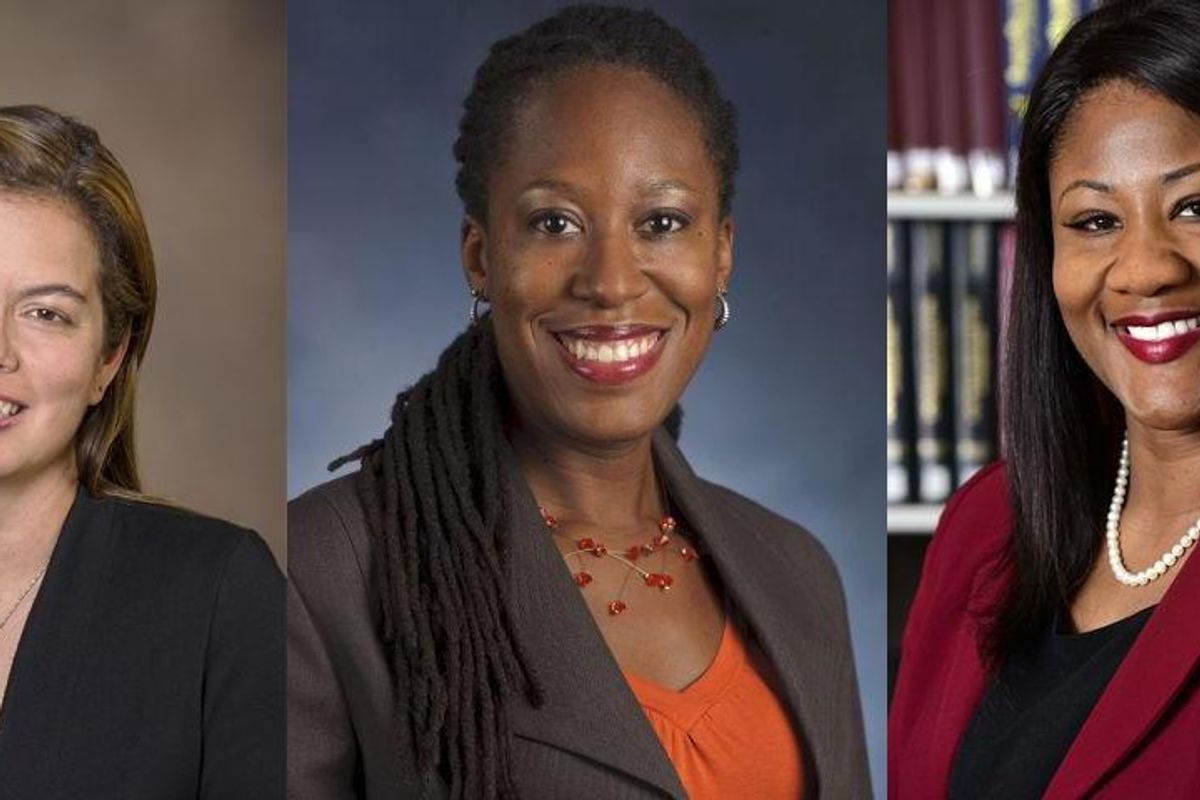
Over the years, we have had countless conversations about our shared research, the field of environmental health, ethical science, the lack of diversity in our field, and how to become successful environmental health and justice researchers.
These last two points have been particularly salient as early-career researchers. Success as a researcher can be elusive — and job security is not a guarantee. We have seen faculty and students leave or be pushed out. We are speculating about the reasons for these departures, but we believe that some may be due to inadequate financial, social, and emotional support by institutions and individuals. Most of these individuals were people of color or from other systematically marginalized groups.
And many don’t even get a chance. Marginalized racial and ethnic groups are underrepresented in academia. While Black and Latino people represent 13% and 18% of the U.S. population, respectively, only 6% of professors in the U.S. are from these groups.
Research also shows biases in funding from the National Institutes of Health (NIH) — the main federal funding agency for academic health researchers — specifically for Black people. These differences are in part explained by the topic areas that researchers propose to study. Notably, Black researchers are more likely to propose studies that examine health disparities and studies that develop ways to prevent those disparities by collaborating with community groups, which in turn have historically received the least amount of funding.
Recently, there has been a groundswell of interest in addressing health disparities and working toward health equity, including in environmental health sciences. We hope it translates into improved health for marginalized groups and leads to more faculty representing those groups succeeding as researchers. We wanted to learn from Black and Latina researchers who are part of this positive trend and have achieved national stature for their work in environmental health disparities as well as developing interventions toward health equity.
We posed four questions to Dr. Paloma Beamer (Professor at the University of Arizona), Dr. Christina H. Fuller (Associate Professor at Georgia State University), and Dr. Chandra Jackson (Earl Stadtman Investigator in the Intramural Research Program at the National Institute of Environmental Health Sciences).
We hope you will learn as much from them as we did. Responses are lightly edited for brevity.
The funding environment is improving for research addressing environmental disparities and environmental justice, but that has not always been the case. Can you tell us how you have dealt with difficult grant environments? How did you persist through times when you had limited or no success in getting your research agenda funded?
Dr. Paloma Beamer

There was a time in my career that I started to believe it was impossible to get grants funded. I remember a colleague telling me that I should consider changing my focus area so that I could get more funding, especially from industry, like him. I ended up developing a line of research looking at the intersection of environmental and social determinants of health in development of asthma in a 40-year-old birth cohort. I was able to develop a team of mentors that really taught me how to write grants, conduct epidemiological analyses, and critically think in a whole new way. This cross-training is what allowed me to be more successful in writing NIH grants.
Dr. Christina H. Fuller

When funding is slim or none, I’ve forged ahead and done research without it. Even with funding, there is a significant amount of relationship building and investment in community dialogue that must be established beforehand. This work is almost never funded but is integral to ensuring benefit for the communities involved. Then I have been able to leverage these relationships for future proposals.
Dr. Chandra Jackson

I am an investigator within the intramural program at National Institute of Environmental Health Sciences, and consequently do not need to apply for grants to support my salary and research program. I, however, would seek to add value to and collaborate with more senior, well-funded investigators who conduct research of interest to me. This also presents an opportunity to sharpen grant-writing skills while the structural barriers to accessing funding are being addressed.
In recent years, there have been discussions of a shift from a large focus on discovery and knowledge generation to being more inclusive of service and political and community engagement. Do you support this transition? If not, why? If so, are you able to push forward this agenda in your work?
Dr. Paloma Beamer

I believe wholeheartedly that this is a necessary step toward achieving environmental justice and health equity. How many more mice need to die before we know that arsenic is bad for you? We need more funding for solutions that address the root cause of the health effects of arsenic. I would like to see more opportunities for community engagement to design interventions to address environmental exposures without having to extend the research to health outcomes, especially for contaminants whose toxicity is well characterized.
Dr. Christina H. Fuller

I definitely agree and advocate for this shift. Research in this arena must be grounded in and with people. A great deal of knowledge is already held by those in the community. The researchers do not necessarily discover new information, but instead can reveal and clarify data and associations for a new audience and with a defined purpose.
Dr. Chandra Jackson

I certainly support this shift because new knowledge can be generated in a variety of traditional and non-traditional ways. We need research that can be integrated along the entire translational spectrum — from basic science to global population health. So, everyone has a role, and technological advancements have made the integration of various scientific disciplines possible. Community engagement through citizen science approaches, for instance, are essential.
We get a lot of advice and imagine you do, too. What is the worst piece of professional advice you have ever received?
Dr. Paloma Beamer

|
I did have one person tell me I should work on my accent. |
Dr. Christina H. Fuller

I was once told that I should not pursue community-engagement in my work, because it would cause my research to be biased. This assumes that other frameworks for research are completely unbiased, which is not necessarily true.
Dr. Chandra Jackson

I was advised to not interview for a particular position since I had already received an offer from what was perceived as a more prestigious institution. Prestige, however, does not automatically equate to tangible benefits, and I think a person should select an institution that can provide the most material and social support to meet the person’s needs or goals.
What is the best piece of advice you received over the years? Or, do you have any advice you would like to share with early career researchers?
Dr. Paloma Beamer

One of the best pieces of advice from one of my first mentors as an assistant professor was to never to agree to anything without saying, “Let me check with my mentor.” While, as I got more experienced, I didn’t always check with my mentor, I learned that it gave me some time to think about the request and if it would benefit my career or the work I’m passionate about. I would tell early career researchers to get a mentor (or a few of them), to focus your time on things that advance your career and the communities you care about.
Dr. Christina H. Fuller

My advice is to not be deterred by nay-sayers or attacks on the validity of your research simply due to its topic or inclusiveness. Focus on elevating research around your interests by utilizing the scientific and lay tools that you have learned as a researcher and a human being.
Dr. Chandra Jackson

I would like to share the following advice: (1) Remain authentic. (2) Define professional and personal success for yourself, and do not rely on society’s definition. (3) Establish a team of mentors who are succeeding in a manner that aligns with your own definition of success along with values. (4) Establish healthy boundaries early and take care of yourself since you cannot “pour from an empty cup.” (5) Be prepared to and get comfortable with speaking up. Marginalized individuals and groups tend to “shrink” or assume their contributions are less significant, but unique backgrounds and experiences fuel innovation and are inherently, as well as demonstrably, valuable.
We feel fortunate to have had the opportunity to learn from these three leaders.
We leave you with three of our takeaways.
Define success for yourself
Our experiences, and those of many others, in academia have been full of scrutiny and failure. Standards for success are high—getting promoted or tenure requires being the absolute best in your field. It’s no wonder that many junior researchers are plagued by imposter syndrome.
Dr. Jackson tells us to ignore what those around us define as success and think about what it means to be successful for ourselves, advice that can be instrumental in finding happiness and fulfillment for those constantly thinking about how to achieve the next research goal, be it your first publication, a grant, or a job.
As one might expect, the quest to be ‘successful’ in research leads to high rates of burnout. Only take on tasks that serve your best interests and do not come at the expense of personal happiness and well-being.
Be creative
Just as we should define success for ourselves, we should define our own trajectories. The super stars whose work you admire came up in a different era, with different questions, different funding environments, and different strategies. The paths to success today are inevitably going to look different.
To improve chances for success, we should aim to have a team of mentors, at different stages in their careers, each with complementary expertise whose explicit focus is to elevate us through tangible sponsorship, as researchers and individuals.
Drs. Beamer and Jackson also offer excellent advice to collaborate with those with histories of success. Still, Dr. Fuller notes that we can make incremental, but important, progress even when funding is absent, especially in our local communities.
Have a strong moral compass to persevere
When we talk about environmental justice, we use the word justice because it is imbued with a notion of ethics and morality.
Hardships in research and academia are expected, but for those dedicated to advancing justice and equity, and especially those from historically marginalized groups, these struggles are even more common.
Our three respondents share vivid examples of overt and indirect threats to their research. Their persistence is noteworthy, but also necessary. Frequent rejection—papers that get rejected or are not cited despite rigor and relevance; grants that don’t get funded—is expected. And yet, each time hurts, and a strong moral compass will help us persevere.
Meaningful institutional and structural support would aid in our struggle for equity and justice.
Dr. Daniel Carrión is an Assistant Professor at the Yale School of Public Health and Dr. Carlos Gould is a School of Earth Postdoctoral Fellow at Stanford University. They are both senior fellows of the Agents of Change in Environmental Justice program.
This essay was produced through the Agents of Change in Environmental Justice fellowship. Agents of Change empowers emerging leaders from historically excluded backgrounds in science and academia to reimagine solutions for a just and healthy planet.





